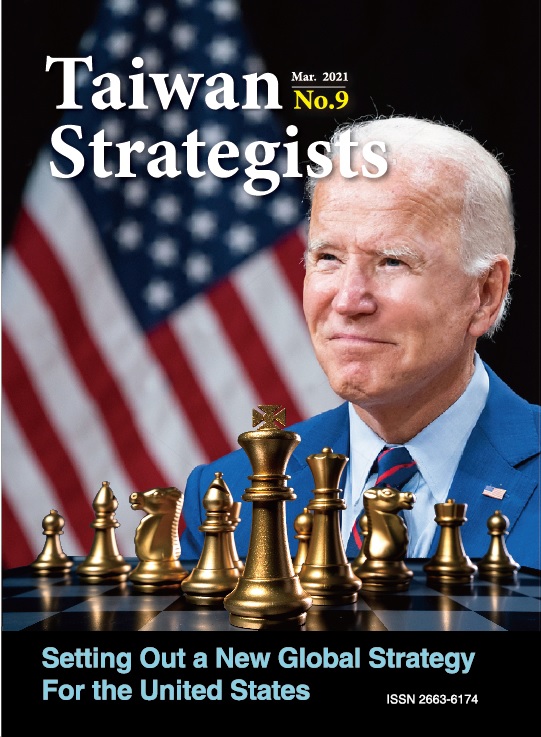Taiwan Strategists No. 9
Taiwan Strategists No. 9 (March 2021)
Pre-assessing the Biden Administration’s Foreign Policy: Its Views, Challenges, and Strategies
Associate Research Fellow, Division of National Defense Strategy and Recourses,
Institute for National Defense and Security Research (INDSR)
Abstract
Challenges and threats under the Biden Administration have seen little appreciable change in 2021-2022, compared to those in 2019-2020 under Trump. The new administration has encountered a number of difficulties in its interior and foreign affairs that do not respect borders or boundaries. Thus, American diplomacy elites in Washington D.C. are looking for a merger of foreign policy and domestic policy. In regards to domestic issues, President Biden has to concentrate on repairing American politics, economy, and society, along with effort towards re-establishing unity, racial justice, and good governance of the nation. Additionally, the cornerstone of the American political system, democracy at home and abroad, has been eroded seriously both by failures inside and authoritarianism outside. In response to the crisis, the President plans to restore American democracy and to seek democratic alliances against sharp power by autocracies. Regarding foreign matters, Washington gets to increase capabilities for its great power competition in all realms, from geopolitics, trade, technology, supply chains, social discourse, COVID-19, and nuclear proliferation, to climate change. Although each of them faces difficulty, it is good and encouraging to see the new government start to revitalize its ties with allies and partners, return to international organizations, and rebuild Washington’s global leadership in terms of power, commitment, and reputation.
Keywords: Great Power Competition, Sharp Power, Democracy, Geopolitics, Alliance
Biden’s Strategic Turn to China: An Assessment of U.S.-China Competition and Cooperation
Associate Professor,
Department of International Affairs and Business, Nanhua University
Abstract
U.S. President Joe Biden and his government officials have put forward a hard line against China in their tenure, describing the authoritarian government as an economic and security challenge to the United States, one which required a more strategic and calculated approach than that of the Donald Trump’s administration. This article will focus on the Biden’s administration strategic turn to China. The following sections will give an overview of the similarities and differences between Biden and Trump’s China policies, U.S. strategic competition and cooperation with China within the rules-based order, U.S. trade policy with China guided by a “foreign policy for the middle class,” and concluding remarks with a future development of U.S.-China relations. Finally, it suggests that for any future U.S. toward China strategy to be effective, it must above all be operationalized rather than merely declared.
Keywords: Biden Administration, China Policy, Competition, Cooperation, Rules-Based Order
The Biden Administration’s Tug-of-War with China: Opportunities and Challenges for Taiwan
Senior Fellow, Global Taiwan Institute,
Senior Fellow, Macdonald-Laurier Institute,
Senior Fellow, Taiwan Studies Programme,
University of Nottingham, UK
Abstract
Uncertainty surrounds any incoming U.S. administration as to its commitment to existing alliance systems and security guarantees extended to small states facing an existential threat. Confronted with an increasingly belligerent China and signals by Xi Jinping that he is running out of patience on the “Taiwan question,” Taipei understands the need to not only continue the deepening engagement with the United States that occurred under the Trump administration, but in fact to see bilateral ties with its security partner reach even higher levels so as to strengthen its deterrence against China. Although the Biden administration has emitted encouraging signals with several references to continued U.S. support for Taiwan, the extent to which the latter will be allowed to participate in a fledging “alliance of democracies” to combat authoritarianism remains to be seen. Still, the viability and efficacy of U.S.-led alliances—whether Trans-Atlantic or as part of an enlarged “Quad” in the Indo-Pacific—will be contingent on the willingness of key regional partners to overcome differences, which in recent years have undermined their ability to implement a comprehensive, concerted, and sustained strategy in response to Chinese assertiveness and rulesbreaking.
Keywords: Indo-Pacific Strategy, Alliance Systems, US-China Relations, US-Taiwan Relations, Democracy





